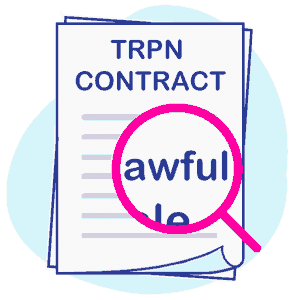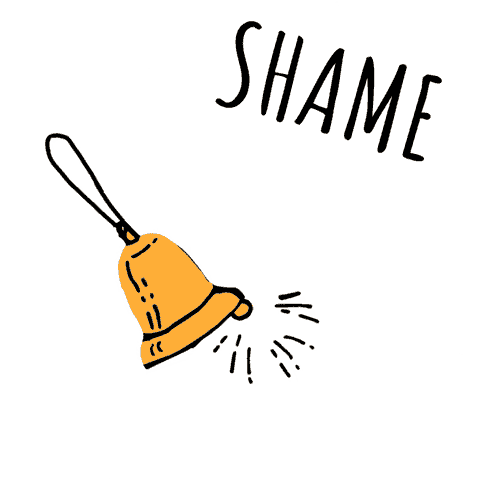Three Rivers Network: 12 Terrifying Terms of Discount Contract

Yesterday, we shared the harrowing tale of a doctor who cashed a strange check from Three Rivers Provider Network (TRPN) — a check that turned out to be something like bait, with a particularly jagged hook inside.
TRPN claims that by endorsing and depositing a $100 check, the doctor executed a (truly terrible) discount agreement with TRPN. As a stark warning to providers nationwide, we outline this agreement's most egregiously awful sections.
Providers must be extraordinarily vigilant. Be sure that staff examines every check the practice receives. If your practice uses a lockbox that automatically deposits checks, you are in TRPN trouble (we’re forced to wonder HOW this TRPN scheme can be legal).
Please heed this warning to avoid being trapped in the TRPN agreement's treacherous terms.
The agreement is dense with opportunities for TRPN to abscond with practice revenue easily — and the agreement makes it extraordinarily difficult for the provider to push back or attempt to extricate themselves once a practice deposits the TRPN check.
The 12 excerpts below are the most glaring bear traps in the contract; for more details, we provide a table further breaking down the agreement at the bottom of this article.
TRPN Check = Contract Signature
As discussed in detail here, TRPN considers depositing their $100 bait-check to be acceptance of their entire noxious agreement. This is especially troubling as many providers have separate accounting departments and/or use lockboxes to receive checks which are automatically deposited. The contract states that the doctor’s endorsement of the check serves as both:
- Acceptance of TRPN’s payment to the doctor for their participation in the network (with all the strings attached)
- An “authorized signature” for the TRPN contract itself (No need to sign on the dotted line — because you already did the second you deposited the check.)
As noted in the table at the end of this article, to cancel the TRPN contract, the provider must return the amount sent by either registered, certified mail, or overnighted within 90 business days of original endorsement.
TRPN Discounts Apply (Way) Beyond Workers’ Comp
TRPN’s ability to plunder practice revenue doesn’t stop at reimbursements for treating injured workers. The contract explicitly applies the TRPN discount to “all services without exception,” including auto and group health claims.
As for the discount itself, the contract states that if a state or federal fee schedule or “benefit plan allowable” exists, reimbursements will be 90% thereof. Otherwise, the discount applied is the dreaded “lesser of:”
- 35% off billed charges
- 10% off “maximum allowable”
- 150% of Medicare rates
TRPN Discount Applies to Everything Out-of-Network
Even if the practice has a separate agreement for out-of-network services with a different entity, the TRPN agreement claims to apply to, and even “supersedes” any other arrangement. In other words, the TRPN agreement appears to make the provider responsible for canceling other agreements.
Doctor = Debtor
Queasy yet? Strap in.
The TRPN contract claims that by joining the network, the doctor becomes TRPN’s “debtor,” and the practice’s reimbursements become collateral for TRPN. If that seems to smack just a little of indentured servitude to you…you’re not alone.
If the doctor gets any funny ideas about pushing back, the doctor will be held responsible for any (and all) legal costs incurred by TRPN to “defend” this monstrosity of an agreement.
TRPN Takes Interest on Overpayments
Per the agreement, if the doctor receives “any overpayment” beyond the amount allowed by the TRPN agreement, the excess revenue will be “deemed a credit for the benefit of TRPN” and be subject to a 7% annual interest rate.
Provider Prison
Where to begin with this paragraph?
The agreement imposes “a 36-month term,” meaning the provider is stuck for 3 years. Even worse, the agreement renews automatically unless the provider opts out six months in advance.
Moreover, the contract stipulates, "All disputes shall be handled through a binding arbitration with jurisdiction and venue located in the State of Nevada.”
Suppose the provider attempts to dispute the agreement itself; in that case, the provider is subject to TRPN’s idea of “full transparency documentation,” which requires “a certified copy of all collections for services rendered over the last 24 months, as well as proof the provider had published both their collections history and billing rates…” Failure to do any of that “shall automatically nullify any challenge” to the contract.
TRPN Discount Will Spread Like Plague
Finally, TRPN reminds the doctor that “...all discounts associated with this agreement shall be deemed the sole property of TRPN…” Therefore, TRPN may share those discounts with any of the “numerous third parties” for which TRPN is “facilitating claims payments.”
In other words, TRPN handles claims for any number of claims administrators, all of which can access the contractual discount.
To say the least, this is a cautionary tale (as written by Stephen King).
Doctors, stay on top of this: if your practice or anyone managing your accounting sees an envelope with a return address for TRPN, get rid of it. Shred it, trash it, call your officiant of choice to perform an exorcism, and forget you ever saw the cursed thing.
For those who can stomach it, we break down further terms of the contract in the table below.
PROVIDER - SETTLEMENT /PARTICIPATION AGREEMENT |
daisyBill Comments |
Endorsement of the attached check shall serve as acceptance of payment for network participation and for all services provided to our membership AND as an authorized signature for the contract below. |
Endorsement of (read: depositing) the TRPN check means that you: • Accept the TRPN payment for your participation in an (unspecified) network AND • Sign this agreement |
In return for network participation TRPN DirectPay shall pay provider an administrative processing fee of $100.00 dollars. |
TRPN is paying you $100 for your participation in an (unspecified) network |
TRPN DirectPay provides its membership and clients access to all terms of this agreement. |
TRPN fails to list its members or clients. |
|
All future payments may be made directly to the provider at the lesser of • 35 percent off billed charges, • 10 percent off maximum allowable or • 150 percent of Medicare with no exceptions allowed. |
See discussion #3 above. |
|
Provider agrees to apply discounts to all services without exception including • auto, • workers' compensation, and • group health claims. |
See discussion #2 above. |
If a state, or federal fee schedule, or benefit plan allowable, exists, the reimbursement rate shall be 10 percent below the fee schedule. |
See discussion #3 above. |
|
Provider agrees that all out-of-network claims shall be processed through this agreement without exception and that this agreement supersedes any other form of out- of-network reimbursement. • A breach of any of the terms of this agreement by Provider shall result in liquidated damages equal to all out-of-network discounts accepted by the provider outside of this agreement. |
See discussion #4 above.
Essentially, this agreement seems to apply to all auto, workers’ comp, and group health claims unless those claims are eligible for in-network reimbursements.
|
To secure the TRPN DirectPay's obligations hereunder, the Provider, as debtor, hereby assigns and grants to TRPN DirectPay, Inc. (the Secured Party), a continuing lien on and security interest in all claims through this agreement as Collateral. |
See discussion #5 above. |
If after having cashed this check, provider fails to honor this agreement, all legal costs to defend this agreement shall be to the responsibility of the provider. |
See discussion #6 above. |
Provider agrees not to directly bill the patient for the difference between the billed amount and the amount tendered by TRPN DirectPay or its customer less any applicable co-payments, co-insurance, or deductibles. |
TRPN fails to define “its customers.” |
In the event provider fails to honor these required terms of payment, or balance bills the patient after the agreed-upon payment is deposited by provider, as immediate liquidated damages a UCC-1 shall be granted in favor of Secured Party TRPN DirectPay in an amount equal to all received payments made through this agreement or any other form of out-of-network payment. |
If you don’t honor the terms of payment, TRPN can declare as collateral every single cent you received through this agreement or any other out-of-network arrangement. |
|
Upon the occurrence of any Event of Default and at any time thereafter, the Secured Party may • declare all Obligations secured hereby immediately due and payable and • shall have, in addition to any remedies provided herein or by any applicable law or in equity, all the remedies of a secured party under the UCC. • Such filing shall be removed immediately after proof of fulfillment of all terms of this ongoing settlement and participation agreement. |
If TRPN believes you defaulted, a huge chunk of your reimbursements are TRPN’s security. |
Provider agrees that by cashing the attached check to be subject to and remain bound to the restrictive endorsement; any overpayment per plan allowable shall be deemed a credit for the benefit of TRPN DirectPay with an accrual rate of 7% per annum; |
See discussion #7 above. |
|
in the event of default; or challenge of payment herein received: provider shall • grant as liquidated damages the ownership of an irrevocable UCC-1 Security Interest as lien against both the billing and rendering NPI in the full amount of the check. |
This spells out more onerous default and challenge of payment terms, this time specifying that both the billing and rendering providers are on the hook. |
|
In the event provider cashes this check in error a grace period of 90 business days shall be granted in which the provider must • notify TRPN DirectPay and return the amount of the check to: TRPN DirectPay at 6970 O' Bannon Drive, Las Vegas NV 89117. • The returned amount must be sent by either registered, certified mail, or overnighted and received within 90 business days of original endorsement. • TRPN DirectPay shall not hold provider to the terms of this agreement in the event membership claims have been submitted during this grace period. |
If you cashed the check in error, you have 90 business days from cashing the check to notify TRPN. TRPN must also receive within 90 days the returned amount of the cashed check. |
All safe harbor regulations regarding the use of restricted endorsement payments apply as upheld by the U.S. Supreme Court. This agreement shall become effective after the 90-day safe harbor requirement has been satisfied. |
|
|
This ongoing settlement agreement begins at the time the check is cashed. The agreement has a 36-month term and will automatically renew unless written notice is provided six months prior to renewal. • Either party may terminate this agreement for any reason provided written notice is given 180 days prior to termination and registered receipt of notice is delivered to the other party. |
See discussions #8 and #9 above. |
This Agreement shall be construed, interpreted under the laws of Nevada; and is subject to the exclusive jurisdiction of the State of Nevada. |
See discussion #10 above. |
Provider agrees to meet and confer in good faith to resolve any disputes that may arise under this Agreement. |
|
|
Provider has the earlier of: A) one (1) year from the date of service, or B) the time period stated in the member's plan and/or payor's timely appeals filing limit, to • audit TRPN discounts and • dispute a claim, and • TRPN may refuse to alter any discounts taken after 1 year has passed from the date of service and not disputed within the above-mentioned time period. |
|
This provision does not alter any statutes of limitations or remedies that are available to parties under the state law. |
Like California Labor Code Section 4609.
|
All disputes shall be handled through a formal binding arbitration with jurisdiction and venue located in the State of Nevada. |
See discussion #10 above. |
|
In any event of a challenge to this agreement, for any reason, including • failure to notify TRPN DirectPay of administrative error in cashing the restricted endorsement check; • failure to return the restricted endorsement check or any other dispute; Provider agrees • to provide full transparency documentation consistent with CMS and HHC regulations/guidelines and • to provide a certified copy of all their collections for services rendered over the past 24 months, as well as • proof the provider has published both their collections history and billing rates for services offered. Failure to do so, shall automatically nullify any challenge to this agreement and create a default rate of federal or state published rates as the acceptance rate of reimbursement for same services. |
See discussion #11 above. As for the requirement to prove that you “published” your collections history, your guess is as good as ours. |
Provider represents that discount offered to TRPN DirectPay pursuant to this agreement constitute their best rate based on provider's actual collections for the same services. |
This is just insult upon injury. |
If within thirty days upon written request provider fails to provide a certified copy of collection history, the reimbursement will be defaulted to 120 percent of Medicare. |
|
Provider acknowledges that all necessary licenses are held in good standing, provider adheres to all state and federal laws and maintains minimum liability coverage of $5,000,000. |
|
|
TRPN DirectPay is facilitating claims payments for numerous third parties through this agreement. • As such TRPN DirectPay is not an insurance company nor obligor of claims. • All payments made including all discounts associated with this agreement shall be deemed the sole property of TRPN Direct Pay, Inc. |
See discussion #12 above. |
Workers’ comp billing requires specialized expertise. daisyCollect agents use our advanced software (and unmatched experience) to protect your practice’s bottom line. Request a demo below:
REQUEST DEMO
DaisyBill provides content as an insightful service to its readers and clients. It does not offer legal advice and cannot guarantee the accuracy or suitability of its content for a particular purpose.



.gif)


.gif)
This is extremely concerning. As a busy urgent care practice manager, this worries me as we see many workers' comp patients in our practice. Not too long ago I received a request from a small "insurance company" that stipulated a reduction in our reimbursement rates of a considerable amount.
When I asked them why I would sign with them as we have contracts in place with all of the insurance companies they had listed and that I wasn't interested in using their company, his response was rude and ridiculous, saying something to the effect that "I will have to tell all of the companies that you are refusing to sign with us"! How dare they! It seems like this is starting to go widespread.